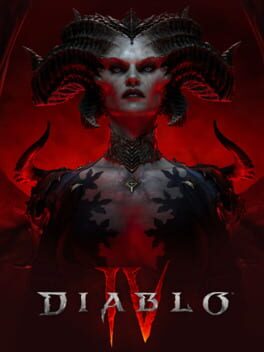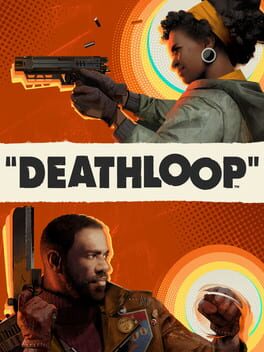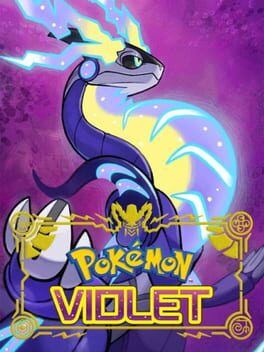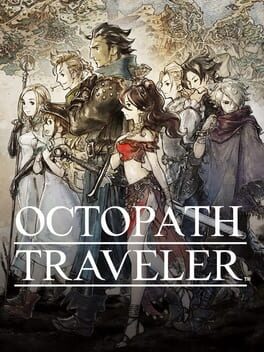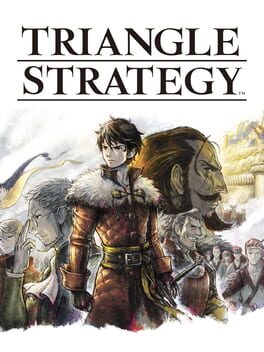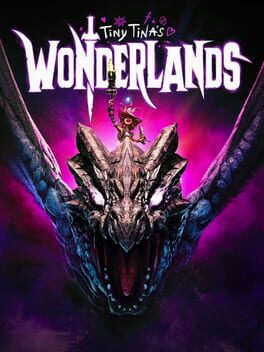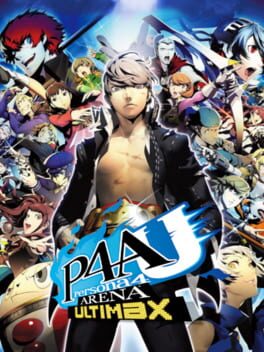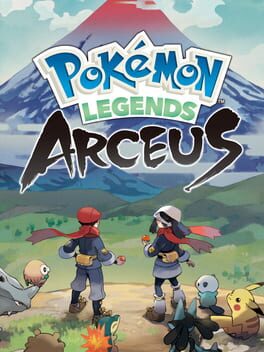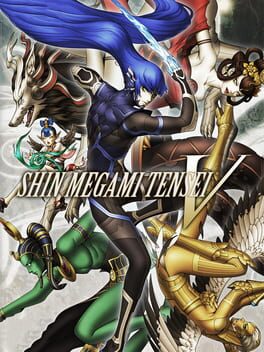labyrinthhaiku
2023
2023
Gorgeous and theatrical, but not quite what I’m looking for in the gameplay department. I felt that most encounters required little more than the same optimal action sequence and dodging as needed. It’s cool to choose your abilities as you level up in the early game and get a feel for how you enjoy playing your class, but once you’ve done so the variety stops and ends at your equipment, which again reaches a point of diminishing returns. Hopefully expansions improve on this. Fun for a little while, but not really worth $70.
2017
2022
Many great games achieve success by letting their players answer the question, “How else can I do this?” Elden Ring gives you more answers than you can count, and even then, you definitely haven’t found them all. The Action-RPG experience has never been more refined, and Elden Ring is a triumphant success for FromSoft, even if the game’s expansive degree of mass and detail induces mechanical issues here and there.
2021
I really wanted to write a more verbose review of this game, but honestly the feelings I have now that I’ve finished it are mostly incomplete. I’m a bit disappointed. There are a lot of loose ends and unanswered questions, and that’s just not what I thought I was in for when I was gearing up to finish the last leg of this game. That being said, I savored it well. All in all, I really really enjoyed playing Deathloop. For all intents and purposes, Deathloop takes the best mechanics from Dishonored and reimagined them in a way that supplements hours and hours of replayability- I even found myself just practicing levels instead of skipping through time periods that didn’t have any tasks for me to complete. Feeling my ability to play the game increase was a really gratifying experience. I loved learning about the Visionaries and enjoyed them all as characters quite a bit, and saying goodbye to them at the end of this game is admittedly bittersweet. Especially when the ending offers so little closure. I guess I’ll just cross my fingers that the supposed rumors about a new sequel or expansion come true someday. Getting through Deathloop was a blast, but ending it was, unfortunately, its biggest drawback. That being said, I know I’ll probably get back to looping sometime again in the near future, if not just for the trophies.
Charlie is my favorite character. Also the soundtrack is really, really phenomenal.
Charlie is my favorite character. Also the soundtrack is really, really phenomenal.
2022
I really want to emphasize that my praise for this games falls on a few things: the systems and mechanics, the art design, the sounds and score (mostly…), and the great amount of content. Those things alone earn it a full four stars for making this new Pokemon entry a blast.
However, this game is not finished, and I'm hesitant to start patting Game Freak on the back just yet. No matter how you look at it, graphically, this game is a wreck, and for no reason other than more time was not spent on it. There's literally a tab for outfits that are not even in the game yet. Some might call that a programming shortcut for the inevitable, I call it putting out your game too damn early. I know they wanted to rush it for Christmas, trust me, I DO know that. But if we keep encouraging this, then it's never going to stop, and we're going to keep being given Pokemon games that will never be realized to their full potential.
But, yes. I am having fun.
However, this game is not finished, and I'm hesitant to start patting Game Freak on the back just yet. No matter how you look at it, graphically, this game is a wreck, and for no reason other than more time was not spent on it. There's literally a tab for outfits that are not even in the game yet. Some might call that a programming shortcut for the inevitable, I call it putting out your game too damn early. I know they wanted to rush it for Christmas, trust me, I DO know that. But if we keep encouraging this, then it's never going to stop, and we're going to keep being given Pokemon games that will never be realized to their full potential.
But, yes. I am having fun.
2018
FromSoftware is iconic for so many reasons, especially for the advent of Dark Souls and its relatives; nobody will ever be able to take that away from them. Through the ingenuity that they've displayed in their (and by "their" I really just mean Hidetaka Miyazaki and his team) ability to provide an intricate, environmentally portrayed narrative, and then additionally supplement it with an equally free-form basis for combat and exploration systems, they've done nothing short of exhibit and establish a standard of game development that few could ever hope to replicate in our generation.
It becomes a pretty inevitable part of the conversation then, unfortunately, when that company deigns to design and develop a game that deviates from those formulas that they've so introduced and established. An inherent component of our ability to comprehend and understand the intentions of a game is comparison; why would we not immediately compare a game developed by a company famed for the formula that they've created and implemented, now, five times over the moment that they develop a game that strays from that formula?
The point that you begin enjoying Sekiro: Shadows Die Twice is also the moment that you become willing to ignore the existence of Dark Souls, Bloodborne, and Elden Ring, and acknowledge it as its own, individual piece of art that stands firmly on its own as a deviation from what we've come to expect from both FromSoft and Miyazaki. Sekiro is the perfect example of a creator being able to prove that they're capable of more artistic potential than just what they're recognized for. Sekiro is Miyazaki's attempt, in my opinion, to create a solid, contained story with unambiguous narrative and thematic intentions while also still fully exhibiting his ability to tell a story without flooding you with exposition and forced necessity - it can be assured that the writing techniques he expresses in Soulsborne games is still very much intact.
Thankfully, Sekiro: Shadows Die Twice's genius goes so much further than Miyazaki's ability to write. It took myself three years of persistence and purpose to finally come to a point where I could say that I fully understood all of the intentions of the game, both in its writing and its overall design. Sekiro is a game that challenges your own willingness to trust yourself beyond the information presented by the game that you're playing - It isn't until you grasp your own sword's capability to act both fully offensively and fully defensively that you can claim to have any kind of skill or intuition regarding gameplay in Sekiro. Again, it was three years before I could even pretend to have a modicum of personal skill or understanding of the game's mechanics - but that does nothing to detract from the very explicit intentions expressed by the game initially. It's simply a matter of having confidence in yourself, as a player, and I think that that's a beautiful player/game experience that few games could ever hope to emulate.
Without giving out spoilers or advice that would potentially ruin one's own learning experiences in the world of the game, it's safe to say that Sekiro is a perfect example of exhibiting tight and intentional gameplay mechanics, level design, and non-linear storytelling that few developers could ever hope to recreate a feeling of in their own products. It speaks volumes that Sekiro entered development AFTER Elden Ring, despite being released three years prior - FromSoftware had a vision that, despite everything they were working toward in Elden Ring and its ability to emulate and surpass the expectations of the Souls games, they still fully applied themselves to a game that stands wholly independent of every expectation that players may put upon them due, exclusively, to the infamy of the art they had already created.
Sekiro: Shadows Die Twice stands tall as its own, fully developed and intentional piece of art, and as a testament to what game developers can put their minds to despite public opinion and discourse. It may go down in history as an incidental sideshow attraction for FromSoft, but I'm more than happy to continue singing its praises to those who don't know any better in the meantime. I give it five out of five stars on this site, as that's the scale I'm limited to, but there is no scale where I wouldn't grant Sekiro a perfect score. 5/5, 10/10, 100/100, whatever. It's a 100% magnificent, perfect exhibition on FromSoftware and Miyazaki's part, and I'm happy and eager to consider it among the greatest video games of all time for myself.
Hella banger of a game, for real.
It becomes a pretty inevitable part of the conversation then, unfortunately, when that company deigns to design and develop a game that deviates from those formulas that they've so introduced and established. An inherent component of our ability to comprehend and understand the intentions of a game is comparison; why would we not immediately compare a game developed by a company famed for the formula that they've created and implemented, now, five times over the moment that they develop a game that strays from that formula?
The point that you begin enjoying Sekiro: Shadows Die Twice is also the moment that you become willing to ignore the existence of Dark Souls, Bloodborne, and Elden Ring, and acknowledge it as its own, individual piece of art that stands firmly on its own as a deviation from what we've come to expect from both FromSoft and Miyazaki. Sekiro is the perfect example of a creator being able to prove that they're capable of more artistic potential than just what they're recognized for. Sekiro is Miyazaki's attempt, in my opinion, to create a solid, contained story with unambiguous narrative and thematic intentions while also still fully exhibiting his ability to tell a story without flooding you with exposition and forced necessity - it can be assured that the writing techniques he expresses in Soulsborne games is still very much intact.
Thankfully, Sekiro: Shadows Die Twice's genius goes so much further than Miyazaki's ability to write. It took myself three years of persistence and purpose to finally come to a point where I could say that I fully understood all of the intentions of the game, both in its writing and its overall design. Sekiro is a game that challenges your own willingness to trust yourself beyond the information presented by the game that you're playing - It isn't until you grasp your own sword's capability to act both fully offensively and fully defensively that you can claim to have any kind of skill or intuition regarding gameplay in Sekiro. Again, it was three years before I could even pretend to have a modicum of personal skill or understanding of the game's mechanics - but that does nothing to detract from the very explicit intentions expressed by the game initially. It's simply a matter of having confidence in yourself, as a player, and I think that that's a beautiful player/game experience that few games could ever hope to emulate.
Without giving out spoilers or advice that would potentially ruin one's own learning experiences in the world of the game, it's safe to say that Sekiro is a perfect example of exhibiting tight and intentional gameplay mechanics, level design, and non-linear storytelling that few developers could ever hope to recreate a feeling of in their own products. It speaks volumes that Sekiro entered development AFTER Elden Ring, despite being released three years prior - FromSoftware had a vision that, despite everything they were working toward in Elden Ring and its ability to emulate and surpass the expectations of the Souls games, they still fully applied themselves to a game that stands wholly independent of every expectation that players may put upon them due, exclusively, to the infamy of the art they had already created.
Sekiro: Shadows Die Twice stands tall as its own, fully developed and intentional piece of art, and as a testament to what game developers can put their minds to despite public opinion and discourse. It may go down in history as an incidental sideshow attraction for FromSoft, but I'm more than happy to continue singing its praises to those who don't know any better in the meantime. I give it five out of five stars on this site, as that's the scale I'm limited to, but there is no scale where I wouldn't grant Sekiro a perfect score. 5/5, 10/10, 100/100, whatever. It's a 100% magnificent, perfect exhibition on FromSoftware and Miyazaki's part, and I'm happy and eager to consider it among the greatest video games of all time for myself.
Hella banger of a game, for real.
2022
While Triangle Strategy doesn’t bring anything groundbreaking to the Tactical RPG formula, it does make for some pretty entertaining turn-based fun. With a variety of unique units to choose from between battles, character backstories to invest in, pixel-perfect dioramas to explore and take in political intrigue, and tough choices that change the course of the story, Triangle Strategy deserves to be considered a contending Switch RPG title, even when it falters with the oft mediocre voice acting, slow burn story and cutscenes, or lack of real customization options. I decided to shelve this game because I’ve got a dozen other things I want to play right now and feel that this game got as much attention as it deserves.
TL;DR - Good, but not as great as I had originally hoped it would be.
TL;DR - Good, but not as great as I had originally hoped it would be.
It goes without saying that Gearbox will likely never top Borderlands 2, and that is unfortunately still true with the release of Tiny Tina’s Wonderlands, but it’s worth saying that the fantasy spin-off holds its own as a strong title worthy of franchise, armed to the teeth with:
-huge amounts of character customization, both aesthetically and mechanically
-a grandiose degree of exploration, looting, and questing both off and on the path of the main story
-countless guns and fantastical spells to choose from and experiment with
-new and memorable characters to populate a fantasy realm instead of a sci-fi one
-entertaining voice performances from Andy Samberg, Wanda Sykes, Will Arnett, and of course, Ashly Burch
As someone who played it on the PS4, my biggest gripes with this game came from the performance; the occasional stuttering and frame drops came to be a nuisance and would turn the whimsical madness of combat into an indiscernible mess. It wasn’t gamebreaking, but it was, at least, noticeably inadequate. If your game isn’t optimized for PS4, don’t put it on the PS4.
The scope of the game is still leagues away from what Borderlands 2 accomplished for the series, but with all of the forthcoming DLC and post-game content that is offered, I’m eager to continue shooting and looting in Tiny Tina’s Wonderlands, and it was, overall, a fun little adventure.
-huge amounts of character customization, both aesthetically and mechanically
-a grandiose degree of exploration, looting, and questing both off and on the path of the main story
-countless guns and fantastical spells to choose from and experiment with
-new and memorable characters to populate a fantasy realm instead of a sci-fi one
-entertaining voice performances from Andy Samberg, Wanda Sykes, Will Arnett, and of course, Ashly Burch
As someone who played it on the PS4, my biggest gripes with this game came from the performance; the occasional stuttering and frame drops came to be a nuisance and would turn the whimsical madness of combat into an indiscernible mess. It wasn’t gamebreaking, but it was, at least, noticeably inadequate. If your game isn’t optimized for PS4, don’t put it on the PS4.
The scope of the game is still leagues away from what Borderlands 2 accomplished for the series, but with all of the forthcoming DLC and post-game content that is offered, I’m eager to continue shooting and looting in Tiny Tina’s Wonderlands, and it was, overall, a fun little adventure.
A game that accomplishes both of the things that it set out to do:
-Be a good fighting game with interesting mechanics and a brilliant cast of fighters with varying strengths and weaknesses
-Be a good Persona spin-off with the iconic characters, music, visuals, and even callbacks to moments in the mainline games; all that you’ve come to love with the series
Even the “new” characters are fun to play and welcome additions to the already broad cast of both Persona 3 and Persona 4 characters. Network connectivity and lag is a problem, and the lobbies are a little sloppy, but hopefully these are problems that will be fixed over time, especially with the arrival of rollback netcode.
Also, Tohru Adachi.
-Be a good fighting game with interesting mechanics and a brilliant cast of fighters with varying strengths and weaknesses
-Be a good Persona spin-off with the iconic characters, music, visuals, and even callbacks to moments in the mainline games; all that you’ve come to love with the series
Even the “new” characters are fun to play and welcome additions to the already broad cast of both Persona 3 and Persona 4 characters. Network connectivity and lag is a problem, and the lobbies are a little sloppy, but hopefully these are problems that will be fixed over time, especially with the arrival of rollback netcode.
Also, Tohru Adachi.
A breath of fresh air and a step in the right direction for Game Freak’s long running and monumentally successful franchise, despite most of the games rehashing the same mechanics and progression beats that have been drilled into our minds since the original Red and Blue. One might be inclined to argue that as Pokemon games are intended for children, the handholding is necessary, but as a, ah, former child, I’d like to politely disagree. If your game is REALLY designed well, it can show you its ideas without a pop-up menu that asks you to read a paragraph or two and then “Press A.”
At the very least, Legends Arceus breaks the mold a bit and changes the way that Pokémon is played, albeit with some pretty underwhelming graphics and somewhat generic locales. The game’s strengths come in the form of its combat mechanics, which are more fast paced than in traditional Pokémon games, and the joy of catching Pokémon with precision ball throws and a little luck. As long as we’re seeing some of these changes and advancements in new games, the Pokémon franchise has a much brighter future. However, I don’t see myself coming back to play this one, for I have no interest in sitting through the droll story and monotonous tutorials again.
TL;DR - A game changer for the franchise, but still leaves a little to be desired from what is the most successful franchise in media history.
At the very least, Legends Arceus breaks the mold a bit and changes the way that Pokémon is played, albeit with some pretty underwhelming graphics and somewhat generic locales. The game’s strengths come in the form of its combat mechanics, which are more fast paced than in traditional Pokémon games, and the joy of catching Pokémon with precision ball throws and a little luck. As long as we’re seeing some of these changes and advancements in new games, the Pokémon franchise has a much brighter future. However, I don’t see myself coming back to play this one, for I have no interest in sitting through the droll story and monotonous tutorials again.
TL;DR - A game changer for the franchise, but still leaves a little to be desired from what is the most successful franchise in media history.
2021
Shin Megami Tensei V might be “Persona without the heart” for some, but for me it was the perfect tone, pacing, imagery, and distinctiveness that set itself apart from its Persona brethren. The thing is that even though I’ve finished the game, I’m not finished WITH it. The entire game is packed to the brim with detail and content that really goes to show where the five plus years of development went. From the myriad side quests and optional bosses to the soundtrack that ventures between ominous ambience and chugging guitar chords, it shows that every detail was paid mind during the development process and the end result was a truly complete game in an era where so few games feel that way. The battle system returns from classic SMT games but is revamped but the massive options available to the player through character customization and how highly customizable your demon party members are. The 3D demon models are pristine, and each with their own unique animations that add plenty of character and detail. While the post-apocalyptic setting is nothing new for the franchise, it’s approached in a fresh and interesting way that sets it apart from its predecessors. Didn’t grab every collectible Miman or finish every side quest before you finished the game? Well you’re in luck, because not only is there NG+ but multiple endings that change the way that the final act of the story plays out, with different bosses and different rewards to boot. Between all of the memorable demon interactions, turn based battles that really make you think, fantastical settings, collectibles, characters, soundtrack, visuals, story, and everything else, SMT5 is my new favorite Switch game and is a must-play for RPG lovers and Switch owners alike.
2021
Between the infinitely smooth and tight platforming mechanics, labyrinthian level design that provides hours of exploration, exciting and challenging boss battles, and colorful visuals that aren’t at all stymied by the Switch’s processing power, there are little to no negative things to say about Metroid Dread. It proves to be one of, if not THE, strongest title(s) in the franchise and is likely to earn yet another playthrough from me in the near future. Thank you, MercurySteam, for not fucking a franchise in the ass the way you did with Castlevania.

